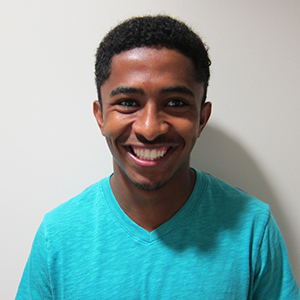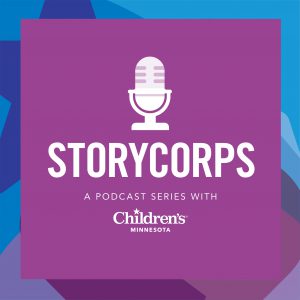Sickle Cell: Matthew’s story


About this episode
Friend, Ephriam, interviews sickle cell patient, Matthew, about his experience growing up with sickle cell disease. Matthew reflects that he appreciates life despite his diagnosis, and that his faith gives him strength. Matthew does not let his diagnosis define him.
Topics:
- Support: Family and faith
- Advice and messages
- Resilience: learning, faith and self-advocacy
Transcript
Ephriam: Tell me about your condition.
Matthew: Sickle cell anemia is where your blood cells sickle up due to hydration, and crystalize, which makes it a lot more difficult for blood to flow through the blood vessels. A red blood cell is typically a circle and rolls through the blood vessels, but since I have SC, which is the lesser form of sickle cell disease, some of them crystalize into C shapes or sickle shapes and so clog up when dehydrated. It’s not a preferable situation, by any means, but it’s definitely a manageable situation through discipline and through lots and lots of consumption of water.
Ephriam: What advice would you give to someone else going through what you’ve experienced?
Matthew: The first and foremost thing is to drink. Drink a lot of water, and never be away from a water bottle with clean water that doesn’t taste bad, because I’ve had to drink quite a bit of water, and when water doesn’t taste good, it’s a lot easier for you to not want to drink it. I think I would really encourage them, too, not to let that be an excuse to not do sports or to not be active or to not get involved into things, because if you let your condition define who you are, then you’ll never really experience life the way it’s meant to be.
Ephriam: What’s the best thing, or worst thing, about having sickle cell?
Matthew: I would say the best thing about having sickle cell would be the fact that you get to realize that life is precious, and realize that humans are not invincible and humans are not immune to everything. It’s really humbling when you have a crisis, or when you have to be taken into the hospital in a wheelchair because you can’t walk, or when you have a temperature that’s over 100 degrees. You just realize that life is precious and that you can’t take for granted everything that life gives you. You get the perspective from … for example, when I was in a wheelchair — I think it was a couple of years ago — coming into Children’s Hospital, I realized how terrible it is to just be in a wheelchair, having to depend on somebody to bring you places, and having to need to use a device in order to move. It was just really eye-opening that walking is a gift.
Ephriam: Since your mom is a nurse, how has she helped you get along or develop a habit that you’re willing to keep the sickle cell as you are?
Matthew: Well, since a young age she’s always been talking about, ‘Oh, make sure you push fluids, make sure you drink water,’ so the water habit, the water-drinking habit, is definitely thanks to her and not of my own being. From a young age, I wasn’t thinking that I had to constantly be drinking water or I’m going to go to the hospital, but she was kind of my eyes and ears for that situation. She’s also been able to help me in the sense of if I need clarity on what medications to take because of joint pain or because of headaches or because of fevers. She’s been there to say, ‘Oh, ibuprofen’s better than Tylenol for this situation,’ or vice versa. She’s also been, since she works in Children’s Hospital, it’s a little hook-up that I have, so every time I go, she knows everybody, she knows what to do, so we’re in and out fairly quickly, most of the time. So it’s just been a tremendous help, and I think God knew what he was doing when he put her in my life.
Ephriam: You have an amazing story so far, but have you experienced any miracles?
Matthew: My whole life is a miracle. You can’t tell me that being adopted from Haiti right before the law was passed that you couldn’t adopt in Haiti — was about to be passed; it was literally an hour after I was adopted — and then to be taken back safely; and then to be put into a family that loves the Lord and that wants the best for me and given me the skill sets that I have and the leadership qualities; and then receiving the Act Six leadership scholarship to have a full ride to go to Bethel; and then being able to have this opportunity just to share my story, you can’t tell me that there’s no such thing as miracles.
We wish to extend our thanks to the families who have shared their story here about the impact of living with hemophilia and sickle cell disease. We would also like to thank the many who worked on this project:
The Children’s Minnesota StoryCorps Legacy Team:
Eddie Gonzalez, Jocelyn Bessette Gorlin, Susan Kearney, Stephen Nelson, Margaret Heisel-Kurth, Stephanie Davis, Angela Blue, Elizabeth McDonough, Jill Swenson and Alisa Linne.
Special thanks to:
Stephanie Moua, Hamdi Hussein, Sadia Farah, Fatima Ali, Caillyn Costello, Suzanne Lehman, Suzan Ulrich, D'Ann Urbaniak Lesch, Justin Nelson, Allison Albright, Marvin Holmes-Leopold, Jose Rodriguez and Mitch Hare.
Minneapolis Institute for Production and Recording:
Jose Rodriguez and Mitch Hare.